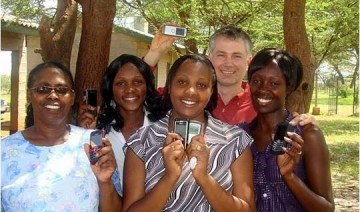Dr. Lester spoke at the 2010 mHealth Summit in Washington, DC on November 9, 2010. Richard is the lead author on an article published by The Lancet (who released the summary online to coincide with his talk).
On the right, nurses from one of the HIV/AIDS clinics in Kenya are pictured with Dr. Lester of UBC.
Link to The Lancet article summary: Effects of a mobile phone short message service on antiretroviral treatment adherence in Kenya (WelTel Kenya1): a randomised trial. The following is the UBC press release for Dr. Lester’s article.
A simple “how are you” delivered weekly through cell phone text messaging (SMS) increases the likelihood that Kenyans with HIV will stay healthy and follow their medication regimen, while reducing the spread of the disease, according to a new study led by a University of British Columbia researcher.Published online today in The Lancet, the study found that patients in Kenya who received weekly SMS “check-ins” were 12 per cent more likely than a control group to have an undetectable level of the HIV virus a year after starting antiretroviral (ART) treatment.
Undetectable viral loads have been shown to be associated with better health outcomes in people with HIV and with decreased transmission to new partners.
According to the study, if the same protocol were applied to the nearly 300,000 Kenyans who received ART under a U.S.-funded program in 2009, it could have resulted in more than 26,000 people with undetectable levels of the virus.
“ART requires patients to take their medication very consistently to ensure the virus stays dormant and to prevent the person from developing resistance to the drugs,” says lead author Dr. Richard Lester, a clinical assistant professor in the Division of Infectious Diseases at the UBC Faculty of Medicine. “But adhering to such a regimen can be particularly difficult in the developing world, where visits to clinics can be arduous and time-consuming, and where civil strife, food shortages, economic hardship and even wars can disrupt people’s lives.”
Lester, who is also Lead Physician in the Division of Sexually Transmitted Infections/HIV Control at the BC Centre for Disease Control, conceived of the text-message support system in Nairobi, Kenya while pursuing a post-doctoral fellowship with Dr. Francis Plummer of the University of Manitoba. He shared the results of this study today at the 2010 “m Health Summit” in Washington, D.C., a gathering of 2,000 participants from academe, government and the private sector, including scheduled attendance by philanthropists Bill Gates and Ted Turner.
Mobile phone usage in Kenya, like much of the developing world, is much higher than landline usage; in a country of 22.5 million people over the age of 15, there were 16.3 million mobile phone subscribers in 2008. Kenya also led the world in mobile money transfers.
Between May 2007 and October 2009, 538 patients were enrolled in the WelTel Kenya1 study from three clinics that provided care for HIV/AIDS patients – one in a low-income section of Nairobi, another in a higher-income section of the city, and a third in a rural district. Half of the patients were randomly selected to receive text message support, while the others did not. This was the first randomized controlled trial to examine the effectiveness of a mobile phone support system with HIV patients.
Those in the support group received a weekly message from their clinic, typically “Mambo?” (“How are you?” in Kiswahili). Patients were expected to respond within 48 hours by either texting “Sawa” (doing well) or “Shida” (have a problem). The clinics then contacted patients who reported a problem or who didn’t respond. Some of the people requiring follow-up communication had fled their homes because of post-election violence in 2007 and needed help locating a new clinic.
Delivered weekly, the messages weren’t intended as medication reminders. Instead, participants reported that they felt “like someone cares” and had an opportunity to address any problems quickly as they arose – potentially preventing health crises from occurring.
“Considering the ubiquity of mobile phones and the minimal expense in sending text messages, this practice can be an extremely cost-effective way of improving outcomes for HIV patients – not only in Africa, but around the world, particularly with transient, low-income populations,” Lester says.
“In addition to helping patients, it can reduce the rate of transmission and the incidence of drug resistance, which then requires the use of more expensive, second-line drugs. Text messaging not only carries a huge humanitarian impact, but significant savings for health care systems and aid programs.”
Lester will next lead two pilot studies in British Columbia using the same method for low-income people living with HIV and for tuberculosis patients, who have similar needs for ongoing treatment.
The Lancet study was funded by the U.S. President’s Emergency Plan for AIDS Relief.
The UBC Faculty of Medicine provides innovative education programs in health and life sciences, teaching over 3,000 students at the undergraduate, graduate and postgraduate levels. In addition, over 700 researchers/faculty members representing all of the Faculty’s 19 departments, two schools and 15 research centres and institutes received research grants. In 2008/09 the Faculty generated more than one-half of the total research funding of the university ($475.3M). For more information visit www.med.ubc.ca.
The BC Centre for Disease Control (BCCDC) is an agency of the Provincial Health Services Authority that provides provincial and national leadership in public health through surveillance, detection, treatment, prevention and consultation services. The Centre provides both direct diagnostic and treatment services for people with diseases of public health importance and analytical and policy support to all levels of government and health authorities. BCCDC investigates and evaluates the occurrence of communicable diseases in BC and is the provincial reporting centre for reportable cases and categories of communicable diseases. In addition, the Centre creates opportunities for scientists, health professionals, university and other partners to contribute their knowledge and experience in resolving the outstanding health challenges facing British Columbians.
Contact
Brian Lin
UBC Public Affairs
Tel: 604.822.2234
Cell: 604.818.5685
E-mail: brian.lin@ubc.ca
